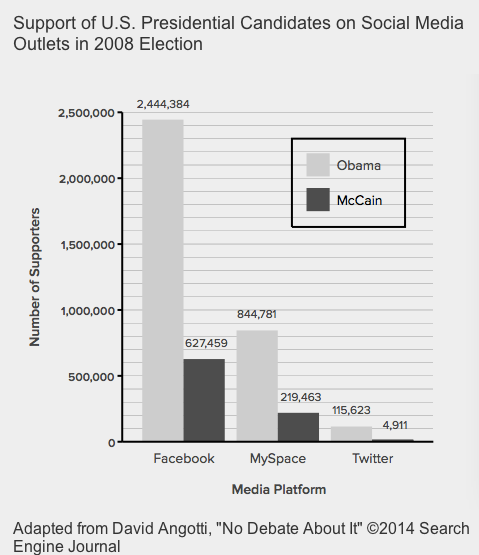Questions 1-11 are based on the following
passage.
This passage is excerpted from Yupei Zhao, “New Media and Democracy: Three Competing Visions from Cyber-Optimism and Cyber-Pessimism.” ©2014 by Yupei Zhao.
Political communication scholars are keenly concerned
with the extent to which new media is affecting politics...
Accordingly, the following sections present the respective
positions of cyber-optimists and cyber-pessimists in relation
5 to three key areas of the debate: how new media enable
minor parties to have a greater [or lesser] presence; how new
media could make it possible to strengthen citizens’ attempts
in political participation; how citizens are using (micro) blogs
to participate in political communication.
10 The first area of debate to be considered here is to what
extent new media are able to put minor parties on a par with
their larger counterparts, in terms of exposure. Minor parties
are able to make use of new media technologies to
disseminate information and promote themselves; typically,
15 these new technologies not only provide broader exposure for
minor parties but also act as additional channels through
which to challenge major opponents and break into the
political debate. However, cyber-pessimists argue that a
higher number of communication channels does not equate
20 with more democracy. Both minor and major parties tend to
approach the Internet in utilitarian terms, using it as a tool to
provide information about policies rather than as a new
platform for the promotion of interaction and
interorganizational links.
25 However, political cyber-optimists have criticized cyber-
pessimists for being too extreme and maintain that new
media might be the decisive element in pushing the
democratic agenda of elections nowadays. For instance,
based on data published by the Pew Research Center, sixty-
30 six percentage of social media users have participated in at
least eight online political activities, such as encouraging
people to vote or posting their comments on politics through
social media. Thus, Internet voters may shape election
campaign agendas to some extent. The fact that Barack
35 Obama obtained an electoral victory following a triumphant
grassroots campaign and successful use of social media such
as Facebook and MySpace is a case in point.
The third area of the debate to be considered here is the
phenomenon of citizen (micro) blogging. Citizens are using
40 social media, such as blogs, Facebook, Twitter, and Weibo, as
a channel for participation in political discussions, aiming to
directly or indirectly influence public concerns or even
reshape the public agenda, promoting the democratic public
sphere. Voltmer, in his empirical study of political
45 communication, revealed the interdependencies between
politicians, citizens and the media, and highlighted why some
media are more successful channels for democratic public
communication than others. Voltmer cites the example of a
Chinese blogger named Lixiaode, who was the first
50 successful case of using a blog as a ‘watchdog’ to expose
numerous official corruptions in China in 2004 and 2005,
thereby broadening the channel of political participation
through blogs. This example illustrates the potential power of
new media, which has already started to challenge the
55 existing political system.
Looking at the three key areas of debate outlined above, it
is apparent that there is nothing inherently democratic about
the new media; the extent to which they are being used to
enhance democracy depends on who is using them and
60 why. . . [But whether] or not new media technologies are
enhancing democracy, they are the driving force behind some
radical shifts which are taking place in politics, and these
changes are inevitably bringing with them both benefits and
limitations.